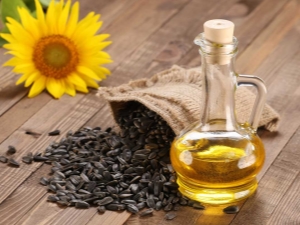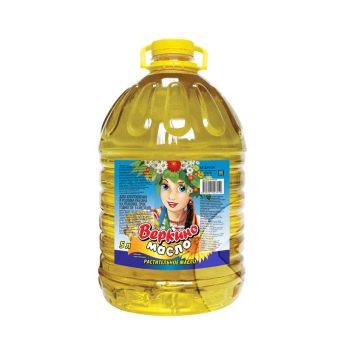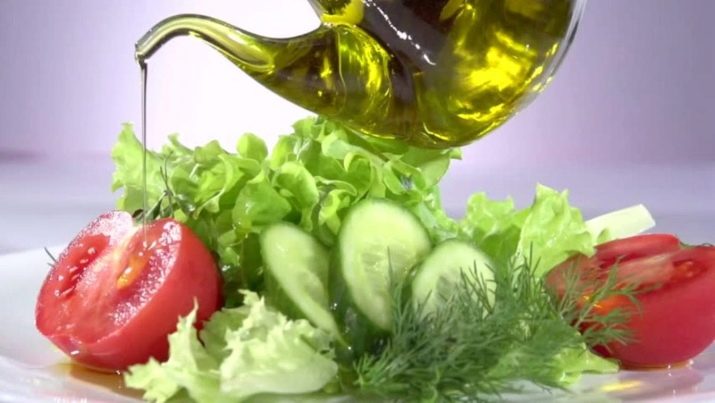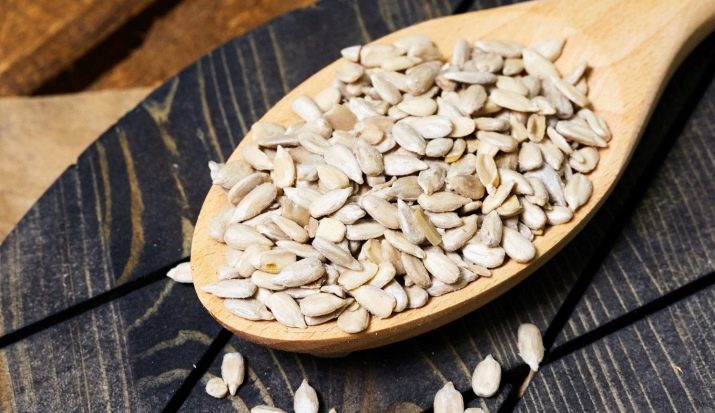Sunflower oil: features, benefits and harm

Practically every housewife periodically deals with sunflower oil. This product is used in the preparation of salads, first courses, side dishes, hot appetizers. However, not all cooks know the effect of sunflower oil on human health. What is the difference between the squeezing of sunflower seeds and its plant analogues? What are the biochemical properties of this product? Answers to these questions can be found in this article.
What it is?
The raw materials for the production of sunflower oil are sunflower seeds. This product is widely used in cooking, the manufacture of paints, pharmacology, cosmetology and other industries.
The production technology of sunflower oil was invented in 1829. After that, this product has become the most consumed among other vegetable oils in our country.
Squeeze sunflower seeds are obtained through various technologies However, they are based on approximately the same mechanism for processing raw materials, which includes a number of sequential processes:
- seed cleaning from the shell;
- processing of purified nuclei into a homogeneous mass;
- exposure to gruel special press;
- processing of the primary product.
Next, the product is subjected to final processing, which also includes several steps.
- Centrifuging - removal of moisture and viscosity change. Using this method, you can remove from the oil only that moisture, which is in a state of emulsion, and solid elements, whose specific gravity is greater than the specific gravity of the oil itself.
- Upholding. Natural sedimentation of mechanical impurities and moisture, which are suspended, with a calm standing oil.
- Hydration (the process of removal of phospholipids from the crude product);
- Filtration. The process of separating heterogeneous systems through porous partitions.
- Whitening The technology involves the interaction of sorbents with oil, so that the product is clarified by removing the compounds that give it a dark color.
- Deodorization. Removal of aromatics from the oil by sweeping the steam under vacuum.
- Freezing. This process is used to cleanse the oil from waxy impurities. Frozen product becomes transparent and changes density.
Production technology and types
Experts identify several types of sunflower oil. When purchasing this product you can read this on the label.
Due to this, without departing from the store shelf, it is possible to add an idea of its quality, composition and direct impact on the human body.
Crude unrefined
In this case, the finished product passed only through the filtering process. This oil contains the greatest amount of useful substances, because the fewer the production stages have passed the product, the more valuable compounds from the primary raw materials remained in it.
This oil has a natural taste and a bright yellow hue. This product will be rich in phospholipids and fatty acids. However, unrefined oil is not intended for long-term storage.
Raw oil can be made using one of the following technologies.
- Cold pressed. This technology consists in pressing a certain amount of seed when heated to 45 degrees.
- Hot spin. Prepared raw material before squeezing is subjected to heat treatment to the boiling point (while it does not burn). Due to this, the finished product acquires a rich aroma and at the same time retains all the useful substances.
- Extraction, or extraction. This method of squeezing oils is considered the most economical. At the expense of it the maximum degreasing of initial raw materials is provided.This technology is considered cheaper, however, the oil will be inferior in quality to products obtained by cold or hot pressing.
- Hydrated. The process of hydration involves the purification of oil from protein mucous compounds and phosphatides using hot water. Hydrated oil can also be higher, first and second grade.
- Refined. Produced by cleaning pressed sunflower seed, consists of fatty acid triglycerides. Refined oil is nothing more than an extract purified from harmful waste components. However, the final product loses its characteristic color, smell and taste.
Depending on the degree of concentration of fatty acids valuable to the human body, the squeeze of sunflower has four types:
- high oleic;
- medium olein;
- high linoleic;
- high stearic.
What is different from other vegetable oils?
Sunflower oil is a type of vegetable fat. Each of them has unique properties. In industrial production uses a wide variety of vegetable fats. Sunflower, in turn, is used quite rarely.
Other vegetable oils are more popular outside of Russia, whereas sunflower is considered to be a primordially Russian product (the technology of making squeeze from sunflower seeds was invented in the Russian Empire in the XIX century). Until now, it is considered the most popular oil from domestic hostesses.
Another difference is in the healing properties, which depend on the plant from which the particular product was produced.
From all of the above it can be concluded that most vegetable oils are undoubtedly beneficial to our health and can be taken not only as a dressing for various dishes, but also as a therapeutic or prophylactic agent. This confirms not only the experience of the ancestors, who mostly preferred traditional medicine rather than traditional treatment, but also the feedback from doctors.
Fortunately, in our time, the shelves of retail chains are almost overwhelmed with similar products for every taste and budget. Buying a home-made product from an unverified seller is risky enough, so try to trust only certified products.
Beneficial features
For the treatment of various ailments and for the purpose of prevention, it is necessary to use only unrefined oil, as it contains the greatest number of valuable compounds, due to which the product has the following beneficial properties:
- takes an active part in the process of formation of nervous tissue;
- positive effect on the state of the heart and the state of the blood vessels;
- helps to reduce the concentration of cholesterol in the blood;
- prevents the formation of atherosclerotic plaques on the vascular walls, thereby reducing the risk of developing coronary heart disease;
- stimulates mental activity, helps to improve memory and concentration of attention;
- contributes to the normalization of the processes of digestion;
- helps to restore deformed bone and cartilage tissues;
- adjusts work of urinogenital system;
- It has a positive effect on the health of the skin and hair.
Squeezed from sunflower is considered a fairly high-calorie product. However, it is often included in a variety of diets, as well as in the diet of children of younger and preschool age.
Contraindications and harm
Sunflower oil in some situations instead of the expected benefits can cause health damage. This can happen in the following cases:
- in violation of the basic principles of storage of the product;
- oil abuse;
- misuse;
- application for the treatment of serious illnesses without prior consultation with a specialist.
Unrefined product is prone to rapid oxidation, because of this it has a relatively short shelf life.When oxidative processes are already developing in its structure, there appears a specific bitterness, which indicates the beginning of the release of toxic compounds.
Therefore, it is necessary to consume the oil before these phenomena begin to occur. Keep it in a dark, cool place.
It is recommended to use this product with extreme caution or to completely abandon its use to the following persons:
- suffering from chronic heart or vascular disease;
- having functional pathology of biliary tract or gallbladder;
- diabetes mellitus;
- people with high blood cholesterol levels;
- with individual intolerance to the product.
Excessive consumption of sunflower seeds can cause overweight. To prevent a similar outcome, it is necessary to take with food no more than 3 tbsp. l product per day.
Manufacturers Rating
Statistics show that the consumption and production of sunflower oil in the world has increased several times in comparison with the figures of the end of the last century. This is due not only to the increase in population on Earth, but also to the emergence of biodiesel fuel, which is also produced from vegetable oils.
According to experts, the Russian Federation is one of the leading countries in terms of consumption of sunflower seeds per capita. That is why it is important to know which brands meet all quality standards. An ordinary buyer will help to navigate among the many brands of the logo "Mark of quality." This title is awarded to five domestic brands:
- "Noble";
- "Sloboda";
- "Zlatozhar";
- "Addin";
- "A generous summer."
How to make at home?
Supporters of healthy food, who do not trust major manufacturers, can make their own sunflower oil at home.
The standard technology for making husks from sunflower seeds consists of the following steps:
- seed cleaning from the shell;
- directly squeezing oil out of them;
- filtering (you can also clean the finished product in another way).
With a well-established home-made production of oil for the purification of seeds, professional equipment is used: calibrators, oil presses, filters.
In the manufacture of a small amount of homemade oil, seeds can be cleaned with a special mill or a familiar meat grinder hostess. Next, the mixture of seeds with spent impurities must be poured with cold water to clean up. After the seeds are completely cleaned, it is necessary to fold them in a colander with gauze so that the water is completely glass.
Peeled sunflower seeds are not suitable for making homemade oil. Otherwise, it will have a bitter taste.
We turn directly to the squeeze oil. The press can be made from an aluminum pan. To do this, at its bottom closer to the middle we make holes (oil will flow out of them). At the bottom we make a hole for a long bolt and fasten it tightly. The function of the piston will be a wooden circle with a special bolt hole, on top of which there will be a nut.
The primary raw material is placed in the press. After this, we begin to slowly tighten the nut. In process of an oil otkhozhdeniye we twist it against the stop. Before the press, you must put the container where the oil will flow.
It is better to clean the finished oil with a special food filter designed for domestic use.
How to make sunflower oil at home, you will learn from the following video.
Application
In culinary art, sunflower oil is used as a dressing for a variety of salads, deep fat, frying, baking, and more.
Also, this product is actively used:
- as a component of anti-aging masks;
- during the cold season or in windy weather, squeezing of sunflower can serve as one of the active ingredients for protecting and restoring the skin of the hands;
- oil baths help to maintain nail health;
- adding oil to homemade hair masks will make combing much easier for the woman, and sunflower extract will also give the hair a healthy shine and softness;
- if you regularly massage the scalp with oil, this way you can strengthen the hair follicles and prevent the process of their loss;
- rinsing the mouth by squeezing sunflower seeds will help speed up the healing time of microdamages of the oral mucosa;
- Baby cream can be replaced with warm oil in the treatment of diaper rash in infants.
Sunflower oil is one of the most popular products in the domestic gastronomic market. This product is used to prepare a variety of dishes, in addition, it is sometimes used in cosmetology and for non-traditional methods of treatment. All this is due to the large number of useful compounds in its composition. The nutritional value and benefits of oil are directly dependent on the production technology, so when you buy you need to pay attention to the method of preparation of a particular product and to check its quality.













































